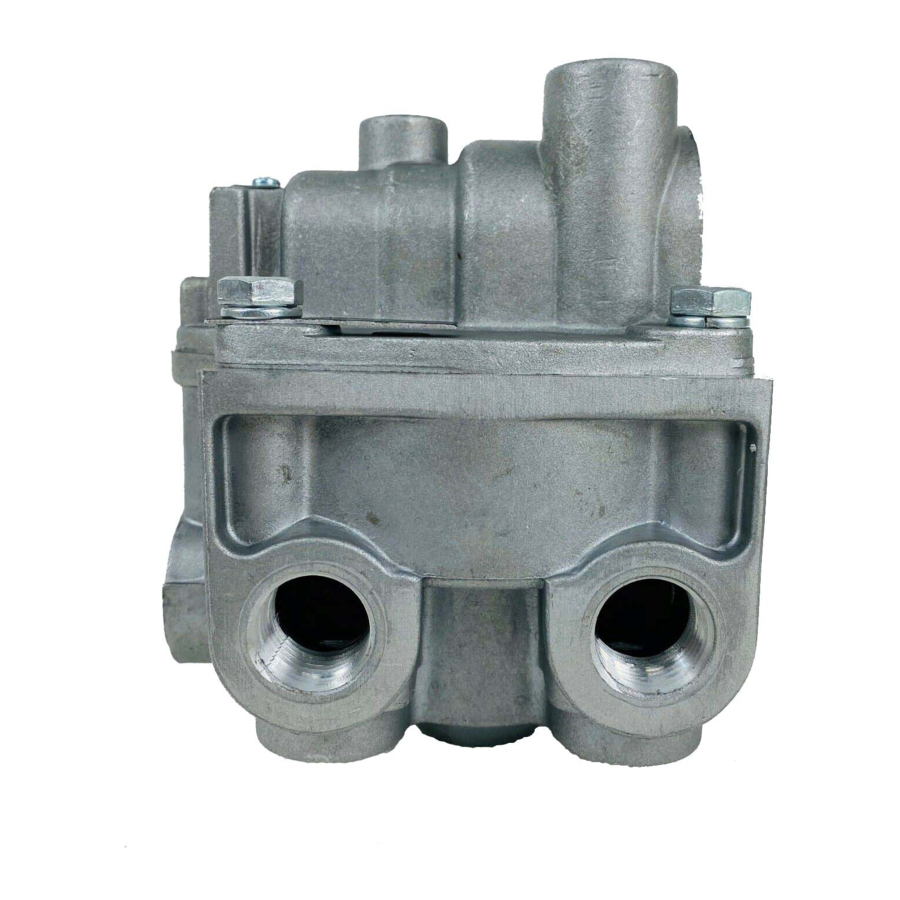BENDIX BP-R1 BOBTAIL PROP RELAY VALVE Manuel - Page 5
Parcourez en ligne ou téléchargez le pdf Manuel pour {nom_de_la_catégorie} BENDIX BP-R1 BOBTAIL PROP RELAY VALVE. BENDIX BP-R1 BOBTAIL PROP RELAY VALVE 11 pages. Bobtail proportioning relay valve

PREVENTIVE MAINTENANCE
GENERAL
Important: Review the Bendix Warranty Policy before
performing any intrusive maintenance procedures. A war-
ranty may be voided if intrusive maintenance is performed
during the warranty period.
No two vehicles operate under identical conditions, as a
result, maintenance intervals may vary. Experience is a
valuable guide in determining the best maintenance interval
for air brake system components. At a minimum, the valve
should be inspected every 6 months or 1500 operating
hours, whichever comes fi rst, for proper operation. Should
the valve not meet the elements of the operational tests
noted in this document, further investigation and service
of the valve may be required.
Perform the tests and inspections presented at the pre-
scribed intervals. If the BP-R1
described or leakage is excessive, it should be repaired
or replaced with a new or genuine Bendix remanufactured
unit, available at any authorized parts outlet.
Every 3 months, or 25,000 miles or 900 operating
hours:
1. Remove any accumulated contaminates and visually
inspect the exterior for excessive corrosion and physical
damage.
2. Inspect all air lines connected to the BP-R1
for signs of wear or physical damage. Replace as
necessary.
3. Test air line fi ttings for excessive leakage and tighten
or replace as necessary.
4. Perform the Leakage Test described in this manual.
Every year, 100,000 miles, or 3,600 operating hours:
1. Perform the Operation and Leakage Tests described
in this manual.
WARNING! PLEASE READ AND FOLLOW
THESE INSTRUCTIONS TO AVOID PERSONAL
INJURY OR DEATH:
When working on or around a vehicle, the following
general precautions should be observed at all times.
1. Park the vehicle on a level surface, apply the
parking brakes, and always block the wheels.
Always wear safety glasses.
2. Stop the engine and remove ignition key when
working under or around the vehicle. When
working in the engine compartment, the engine
should be shut off and the ignition key should be
removed. Where circumstances require that the
engine be in operation, EXTREME CAUTION should
be used to prevent personal injury resulting from
contact with moving, rotating, leaking, heated or
electrically charged components.
™
valve fails to function as
™
valve
3. Do not attempt to install, remove, disassemble
or assemble a component until you have read
and thoroughly understand the recommended
procedures. Use only the proper tools and observe
all precautions pertaining to use of those tools.
4. If the work is being performed on the vehicle's
air brake system, or any auxiliary pressurized air
systems, make certain to drain the air pressure
from all reservoirs before beginning ANY work
on the vehicle. If the vehicle is equipped with an
®
AD-IS
air dryer system or a dryer reservoir module,
be sure to drain the purge reservoir.
5. Following the vehicle manufacturer's recommended
procedures, deactivate the electrical system in a
manner that safely removes all electrical power
from the vehicle.
6. Never exceed manufacturer's recommended
pressures.
7. Never connect or disconnect a hose or line
containing pressure; it may whip. Never remove
a component or plug unless you are certain all
system pressure has been depleted.
8. Use only genuine Bendix
components and kits. Replacement hardware,
tubing, hose, fi ttings, etc. must be of equivalent
size, type and strength as original equipment and
be designed specifi cally for such applications and
systems.
9. Components with stripped threads or damaged
parts should be replaced rather than repaired. Do
not attempt repairs requiring machining or welding
unless specifi cally stated and approved by the
vehicle and component manufacturer.
10. Prior to returning the vehicle to service, make
certain all components and systems are restored
to their proper operating condition.
11. For vehicles with Antilock Traction Control (ATC),
the ATC function must be disabled (ATC indicator
lamp should be ON) prior to performing any vehicle
maintenance where one or more wheels on a drive
axle are lifted off the ground and moving.
OPERATION & LEAKAGE TESTS
OPERATING TEST
To properly test the function of the BP-R1
test gauges or gauges of known accuracy must be used.
1. Park the vehicle on a level surface and block the wheels
and/or hold the vehicle by means other than the air
brakes.
2. Drain air pressure from all vehicle reservoirs.
3. Install a "tee" at the BP-R1
at one of the delivery ports, then install a gauge in
each.
®
replacement parts,
™
valve, a pair of
™
valve service port and
5
